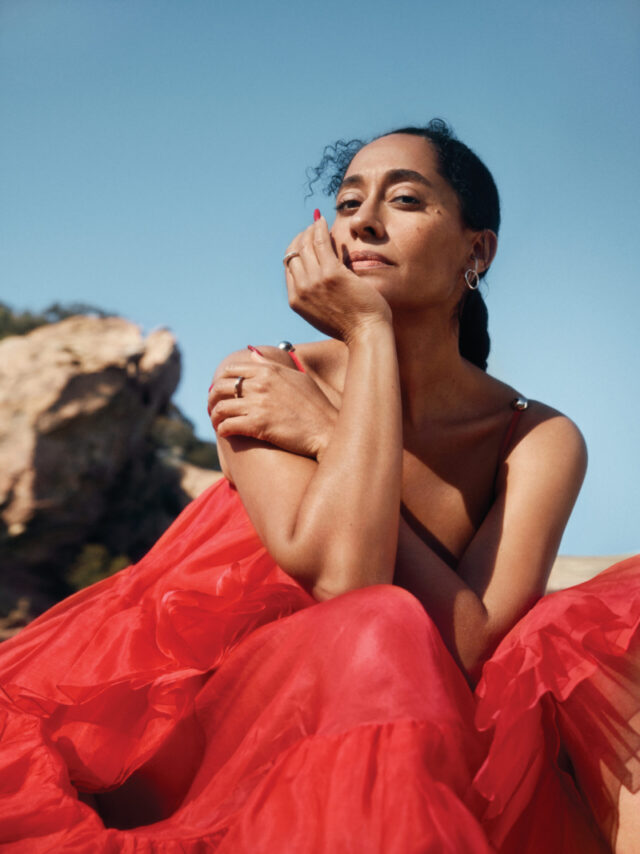
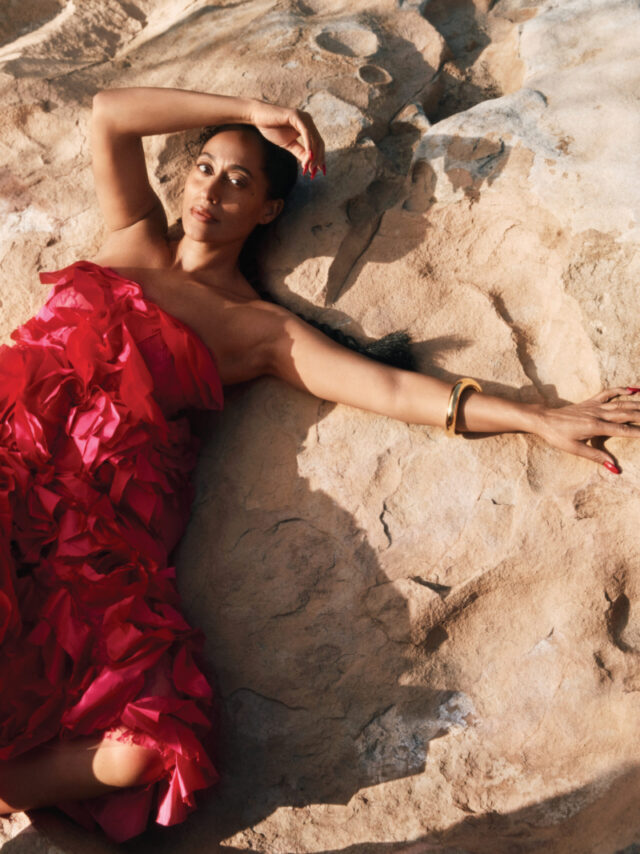
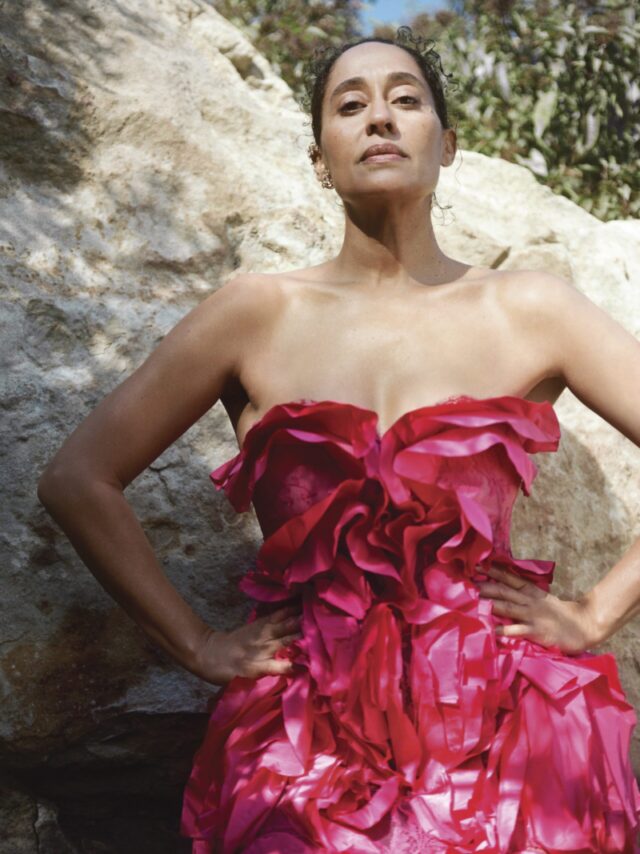
CRISTINA CUOMO: Happy birthday. Welcome to 50.
TRACEE ELLIS ROSS: Welcome to 50. I’m so happy up here. It’s a really nice place. I think there’s a higher vibration up here.
CC: I absolutely loved your Oh, Hello 50 video and your quote, “I could intuitively handle situations which used to baffle me. I have an unbreakable and unshakable foundation for life underneath me.” What are some of the things that have brought you to this remarkable place? I know you to be a wildly intelligent, thoughtful, lovely person, having known you in college.
TER: I feel like at this age I have amassed so many different tools and modalities of how to navigate this crazy, wonderful thing that is life, that is not a movie. It’s not a fairy tale, and the real thing requires community, support, a lot of baths, therapy, exercise, meditation, really good sleep, a lot more water than I think anybody sets out to think you should be drinking in a day. At 50, you do a lot of taking stock. I feel like it’s a privilege to be able to get older, to be able to be here and actually have realized that some of the stuff I’ve done has worked.
CC: On your new show on Hulu, The Hair Tales, you’ve given power to having real conversations about everything. That’s an important thing to remember when it comes to conversations around the dinner table during the holidays. What were some of the holidays like at your home growing up?
TER: Well, my mom [Diana Ross] is real big on holidays, and birthdays are within that category. She just loves a celebration, and it’s funny because I don’t know if it’s in response to that—I don’t decorate for the holidays and Christmas. I don’t have children, so that also could be part of why I don’t feel such a need to do that. But for me, what I grew up understanding and experiencing about the holidays is they are an opportunity to gather with your loved ones. I absolutely love my family but I also really like them. We still cannot wait to get together for the holidays. We’re usually all in one house, and we usually cook with each other. I have friends who at least once a year get together, usually in Italy, for an extended period of time. It creates a very special kind of bond; it’s different from meeting intermittently, joining for a couple of hours and then disappearing. So, that’s what I look forward to. It’s what I come from; it’s a part of my foundation.
CC: Traditions and rituals. You cover a spectrum of Black identity and culture in the new series, which is just a lovely love letter to Black women. In the show’s intro, you say every kink, curl and coil in a Black woman’s crown has a hair tale. This mission to create more space for belonging, self-actualization and community is centered around hair. It’s not just a conversation about hair. Why was this important to you?
TER: One of the missions in my life that flows through all the things that I do is really about joining the chorus of people who are helping to create a safer, more just world where we can all be free. Free to be ourselves, and free to be who we are authentically. I have a particular eye toward Black women and girls, and really doing whatever I can to expand the real estate and safety for us to be ourselves and for our humanity to have room to blossom and be flexible and just be present. The idea for Hair Tales sort of dovetailed right into that mission. The idea was brought to me by Michaela Angela Davis. She was doing a version of it and wanted to turn it into a television show. This was an opportunity in a really beautiful way to give space to this experience that so many of us are in. It was a great experience for me as an executive producer, with an opportunity to interview and listen.
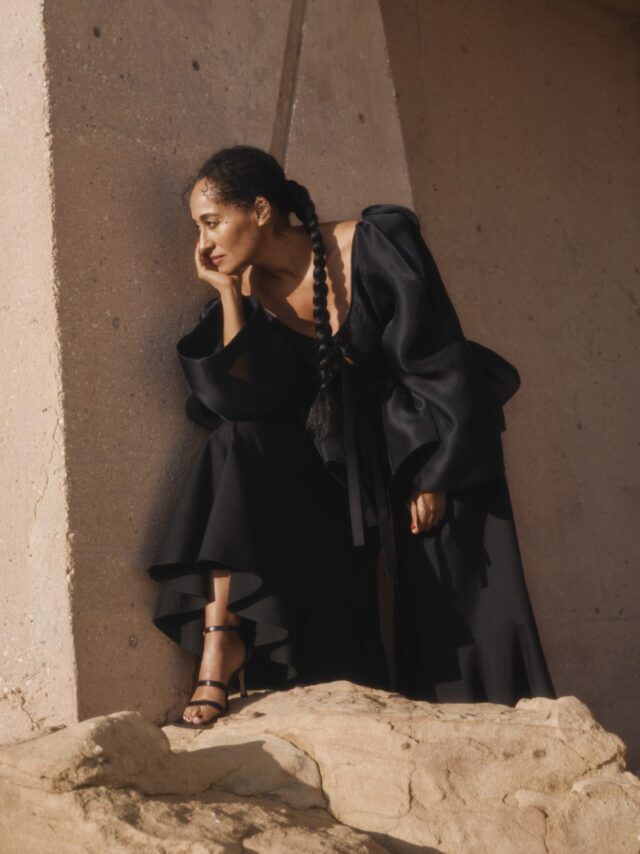
CC: You’ve certainly led by example, and speaking of being a good example to others and the importance of mentors, Oprah Winfrey, as you said in your series, is one of those who helps people discover a life bigger and more brilliant than they ever imagined. How has she influenced your life?
TER: She’s interviewed my family three times, interviewed me twice and then I got to interview her. Someone once asked her what is her next dream or something like that and she said I think I’m living in God’s dream for me. And I think that’s part of what she has been, a beacon of living in your purpose. We had pitched this show to numerous places, most of whom did not understand it, did not think it was “sexy or interesting enough for television” and “what was the angle” and blah, blah, blah. That often happens. The experience of Black women is not considered interesting enough to put at the forefront of storytelling, which I disagree with. I don’t know where this weirdness comes from.
CC: But what you’ve created is so interesting and different.
TER: I’m so glad you felt that way, and I did, too. But it was interesting, because when we pitched it to Oprah, we didn’t even have to finish the pitch. She was like yes, I get it. I have a hair tale, let’s make it. We’ve got to get to the business of making a beautiful show immediately.
CC: With your clean hair care brand, Pattern Beauty, you’ve incorporated safe ingredients. I see how that ties now into an exploration of the ways that Black hair and beauty culture have lit the way to self-acceptance and self-care. What has your own journey with beauty and beauty culture looked like?
TER: I have the distinct honor of being my mom’s child. I was raised watching a woman utilize beauty as an entranceway into agency. My mother always did her own hair and makeup for the stage. I would watch her transform into another version of herself, but it was still herself and it was one that she was in charge of. She wasn’t being tarted up by other people. It was a way that she glamorized herself, and then she would stand on that stage in command of a room as a way to wield and transfer love and connectedness. And so as a result, for me my first relationship with beauty was through that. When I started to embrace my own hair, et cetera, I wasn’t seeing it mirrored back to me. Sure, I was seeing it in my mom, but no teenager cares what their mother looks like. You want to look like the people that are in the music, doing the music that you love and on TV and the shows that you love. I didn’t see my hair texture. And so I started a contentious relationship both with my body and my hair somewhere in my early teens. From that point I had to lose my connection with my hair and then find it again.
CC: Is that how you conceived Pattern Beauty?
TER: That is one of the ways. Pattern Beauty was 10 years in the making before we launched. I wrote my first hair care brand pitch when I left Girlfriends and it took me 10 years of trying to make it happen. Everybody thought, “Why do we need another hair care brand?” “I don’t understand. You’re an actress. Why do you think you can tell us anything about hair?” I just kept rearticulating and clarifying my vision. What became our first set of SKUs was what I wrote in my hair care brand pitch 11 years before they got on the shelf. I remember I was in Women’s Wear Daily receiving an award for the brand. We’re now this multimillion dollar company and winning awards. One woman from a very well-known company, who had been part of my journey, part of my noes, said to me, “You said all of these things to us about seven years ago, and we did not agree with you, or think that this was the road map, and look at you now.”
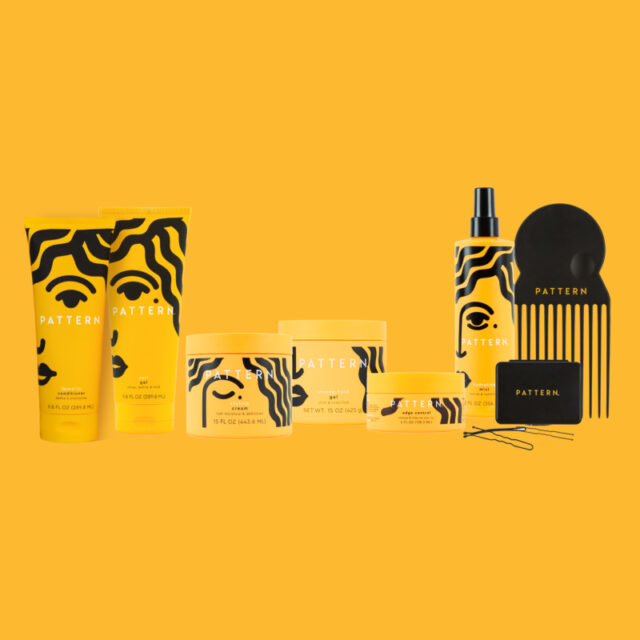
CC: That must have been fulfilling.
TER: There needed to be a paradigm shift in how Black hair care was marketed. But it’s really marketing in general that I had an issue with. Marketing is based on, You’re not good enough, you have a problem and you need to buy these things to fix it. I just don’t agree. I wanted to create a company that was based on the marketing of, There’s not a problem. I want to meet you where you are, support you and celebrate you with the needs that you have. I wanted to create formulas that I believed didn’t exist. I remember my mom came in my room when I was 14 and she said, “Listen here, little girl. You cannot spend any more money on hair products. I don’t know what’s happening.” I was buying everything—René Furterer, JF Lazartigue, the most expensive products you could buy.
CC: So, it was in the making early on.
TER: Yes, she was like, You better get a rich husband or a great job. So I created a hair company. That’s what happened.
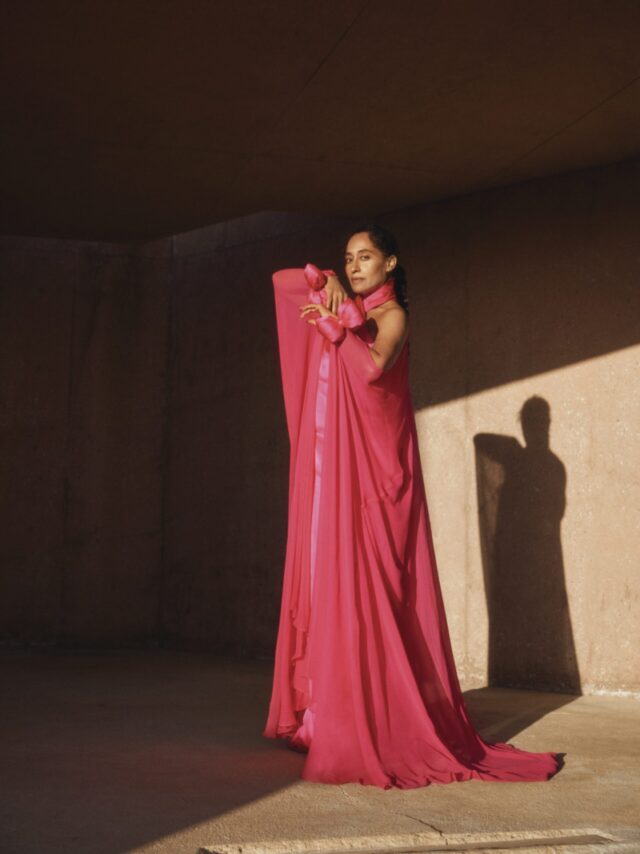
CC: What were some of the great lessons your mother imparted to you?
TER: One of my favorite ones was, “Did you do your best?” I remember my SATs, for example—I just hadn’t done well on my SATs, and I was so upset and I thought I was going to ruin my future. I remember my mom saying, “But sweetheart, did you do your best?” And I said, “Yes.” She said, “Did you study? Did you do all the things you knew you could do?” I said, “Yes.” She said, “Then this is where we are, and then we’ll just look at how to make the difference. What you did was your best, and that’s what matters.” Oh my god, my mom is ringing through right now. How crazy is that.
CC: I love that.
TER: I literally just said her name. And then some of the other lessons are to go toward the love, go toward the things that make your heart sing. That’s how you will find your path. Don’t make decisions out of fear or money. She used to always say, “Don’t hold on to things too tightly. They will slip through your fingers. Hold things with a loose grasp.” The other favorite one that bugged the hell out of me growing up but really has been a helpful thing was when she used to say, “Did you make a new friend today?” I remember turning around in high school and I was like, “Mom, I’ve been at this high school for four years. I know everybody here.” She was like, “Did you talk to somebody different?” Now I look back and I think it’s one of the mottoes of my life now. It’s like, lean into kindness and connect with people, even if you don’t know them. A smile goes a long way. My mom and my dad [Robert Ellis Silberstein] set really good examples. My dad has the best sense of humor. I get it from him; the best part of his sense of humor is his sense of humor about himself. It’s something that I adopted, and I think I came by it through DNA, but I definitely have stuck with it.
CC: You’ve mentioned that you’ve healed yourself through meditation and breath work and I know you’re very physically fit—you practice different interval training and battle ropes and Tracy Anderson. What are some self-care practices that you do, and what are your self-care philosophies?
TER: My self-care philosophy is really around a space of wholeness and choosing compassion, curiosity and kindness over judgment and whatever the other matches would be to those words. I do practice meditation. It is not anything traditional; I don’t practice any religion, or Buddhism specifically, or anything like that. My spiritual practice is one that I have gathered through all the years of trying everything and I’ve taken on the things that work and feel the most comfortable for me. Sometimes it is as easy as me not thinking of 700 things at once while I do the dishes. I don’t know if you saw on Instagram last night, but I did a deep condition of my hair and ended up organizing my drawer with all my hairpins and rubber bands and everything.
CC: Impressive!
TER: I separated the big pins from the small pins, which I’ve wanted to do since I moved into this house, and they somehow got all jumbled in together. I often start a day with a bath instead of a shower, because sometimes at 4 AM a shower is too abrupt for me. I love a bath at night. I do a moisture mask constantly. I work out at least two times a week, but my preference is four. I spend so much time in my head as a CEO, as an executive producer and doing the business of my career and so much time talking in what I do, that I really love the hour when I get to work out.
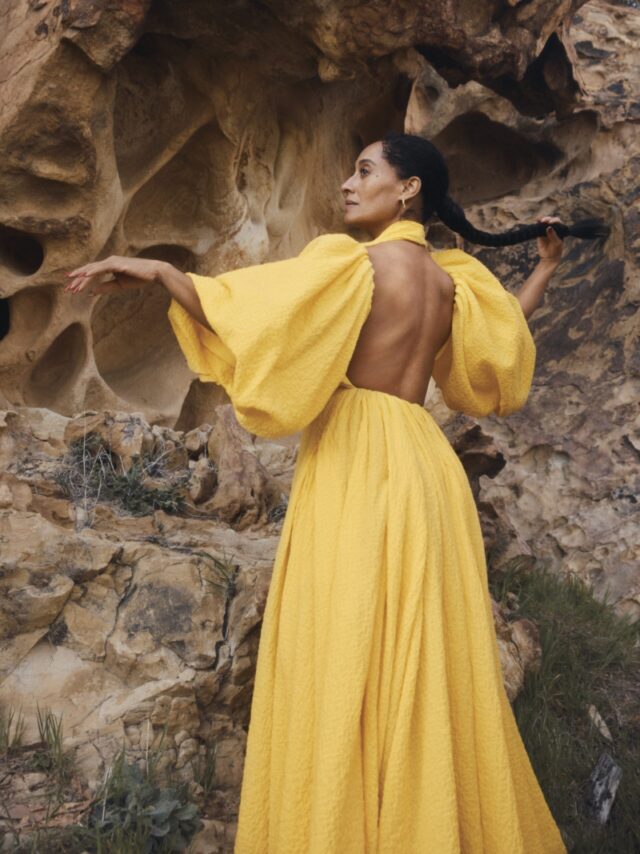
CC: You have over 11 million followers on Instagram. You’ve inspired so many with your insight into every aspect of your life and, of course, your humor. One follower wrote, “I admire and appreciate you sharing so many different parts of your life with the public. Very inspiring to step into being more transparent and authentic.” Why is being transparent and authentic so important to you?
TER: One, because I refuse to let a public persona or even an Instagram version or social media version of myself create a distance between who I present to the world and who I really am. At 50, to feel as fit and in my body and have a sense of wholeness and wellness that I have, it’s hard-earned. At 18, I woke up with flat abs. At 50, not so much. I work out really hard, and my working out is yes, because of vanity, but it’s also because when my body is strong, my heart and mind can do the things that they want to do. I can live out my dreams and work a 15-hour day.
CC: What’s something you’d like to do that you haven’t done yet?
TER: I would really love to do an action movie. I would really like to go to Japan. I would love to write a book, and I’d really love to find a partner, a husband. The right husband.
CC: I don’t doubt that all those things will happen for you in the coming years. One last question. You said before the midterm elections on your Instagram that mischief is done at a state level. Everything we hold dear is under attack. You use your voice for good. What are the political issues that motivated you to spread the word to vote? What change do you want to see happening in the world?
TER: I would like the right to bodily autonomy to be ratified and put into law so that it cannot be changed. One of the most empowering things is to vote, and they say self-esteem comes from being of service to the greater good. I believe in democracy. I think we have taken for granted that it is just going to be here, and that is not the case if we do not keep showing up.



